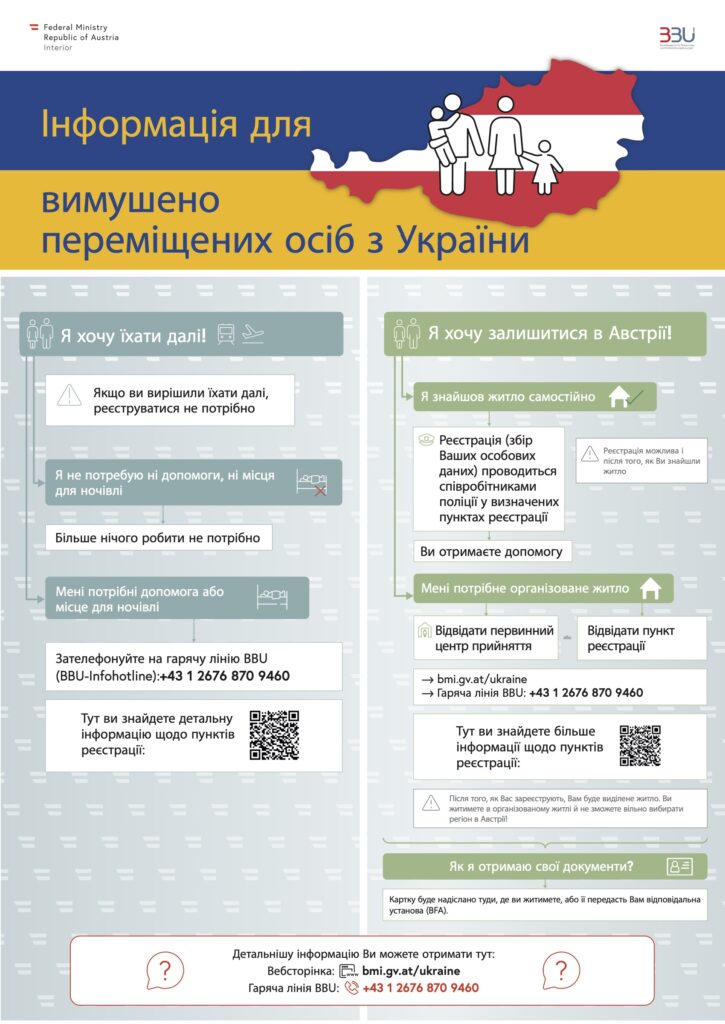Due to Russia’s invasion of Ukraine, the Austrian Government made a point of saying that they would aid Ukrainian refugees, who are trying to flee from the war. Every country has different rules for what you need to do, have, and get in order to stay in the country as a refugee. In some cases, it can affect the decision-making of which country to choose (if there is a possibility to choose or to have time to think about that).
So I decided to do research on how Austria helps refugees, how it provides them with the important/needed information and about the path a refugee takes from the beginning of their arrival in Austria.
What to my mind was done really well is this illustration, which was provided by the Federal Ministry Republic of Austria:

Unfortunately it is only in Ukrainian language but provides a refugee with two types of ways they could take:
- The first one (the blue one) is for people who don’t plan to stay in Austria and want to travel further. And the person instantly gets the info that he doesn’t need to register, and the arrows indicate possible needs that may arise (such as accommodation for one or several nights) and where to find the right help for this type of situation.
- Another one (the green one) is for people who want to stay in Austria. A refugee gets instant information that they have to find accommodation in order to register, where to do that, and the information about how exactly they will receive their documents in Austria.
Also, there are QR codes with additional information + phone numbers. [1]
The Federal Ministry Republic of Austria also created a PDF document with questions and answers regarding staying in Austria, registration, and finding accommodation [5]. What helps a lot is that in this PDF refugees can find the offices they need for a specific type of problem in different regions of Austria, their addresses, emails, and phone numbers, and most importantly working hours and if a refugee would need to make an appointment for that or not. This is very important because in Ukraine we don’t really have a culture of making appointments, we just find the working hours of a certain office and go whenever suits us. Because of this mentality difference, the culture of making an appointment is unfamiliar and strange to many Ukrainians, especially those who have never been to other countries before. I found this out by going through and analysing some messages in online group chats created by Ukrainian refugees, who are now staying in Austria. A lot of people just get confused and surprised by that information.
In order to have access to the Austrian labor market, one must first register at the place of residence, then register with the police as a temporarily displaced person – and receive a “blue card”(«Ausweis für Vertriebene») about two weeks later. Having such a card, Ukrainians receive the same rights as EU citizens. The card is still valid until March 2023. And as I researched through messages I found out that most people prefer this, instead of registering as a refugee because this will allow them to move between countries, visit people they know in other countries, and work. [2] [3]
Therefore, there are different paths/opportunities for a refugee in Austria. If one is only travelling through Austria to another country, he can receive needed help and doesn’t need to register. But if he wants to stay in Austria, then there are two ways:
- Getting a blue “blue card”, which allows a refugee to move between countries, opens the door to the labor market in Austria.
- Registering as a refugee, which will require to register at Caritas and allow receiving a minimum support from Caritas in the amount of 200 euros.
The European Union Agency for Asylum created a PDF file as well for Ukrainian refugees about not only refugee protection, entry and staying in Austria, etc but also the general information about Austria itself, its administrative settings, language, population, and emergency contacts [4]. They also added information about the Ukrainian diaspora in Austria. Moreover, refugees are also able to find information about what everyday life in Austria looks like, when most shops are open/closed (by the way, the working hours of the shops completely differ from those in Ukraine), how schools and universities work and overall access to education.
This kind of information is crucial because a lot of things are different in terms of how everything works, cultural and administrative differences, which can make staying as a refugee either easier and smoother or more complicated and stressful. This can also affect how easy it will be for a refugee to integrate into a new environment and start life from scratch.
References:
[1] https://austria.mfa.gov.ua/news/do-uvagi-ukrayinciv-yaki-pribuli-v-avstriyu
[2] https://ukrainian.voanews.com/a/vijnavukraini-bigenci-ukrainci-ukrainckibigencivevropi-dopomohaukraini/6727156.html
[3] https://kiyavia.com/articles/vazhliva-informaciya-dlya-bizhenciv-v-austria
[4] https://euaa.europa.eu/sites/default/files/2022-06/Booklet_Austria_EN.pdf
[5] https://www.bmi.gv.at/ukraine/files/145_2022_FAQUkraine_Homepage_UKRAINISCH_V20220321.pdf